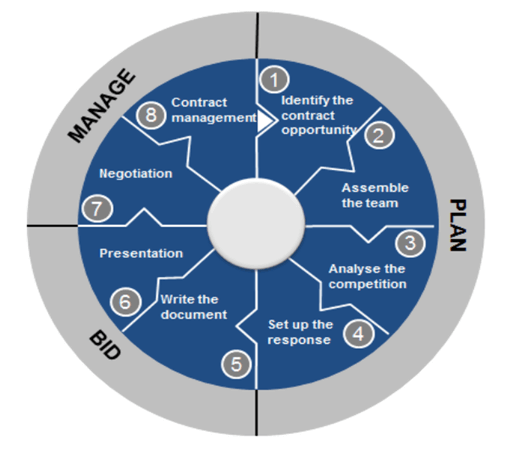Tendering means a company or organization wishing to obtain goods or services will first specify requirements. Subsequently, it will open the bidding in a process known as Tendering. Interested companies can submit their proposals to the client within a finite deadline. The procurement team will evaluate the bids to decide which offer best suits its requirements. The company that has successfully won the tender will be selected to perform the work by contract.
For projects or procurement, most organizations have a well-defined tender process, as well as processes to govern the opening, evaluation, and final selection of the vendors. Tender offers related to takeover attempts, the conditions of the offer are clearly listed and include the purchase price, details and a deadline for a response. The tendering process is set out in a few stages to ensures the tender is well managing, fair, transparent and in line with organization principles.

Table of Contents
Tender Preparation Process
The procurement team develop the tender and evaluation criteria and involve relevant stakeholders in drawing up specifications that clearly define the scope of the project for which Tender Documents are to be prepared. This document must define all project requirements (including envisaged functional goals, performance, technical criteria, completion dates or term date requirements) for the project. A cost/benefit exercise is carried out, taking into account the initial cost estimate, time estimate and expected costs/revenues over the life of the project. Undertake appropriate research at this stage such as gaining the understanding of the product/services and market conditions, some of the risks may face example via internet and suppliers or industry peers. Review historical spend patterns if appropriate etc.
The tender evaluation criteria need to be defined prior to sending out the tender document. The thought process is important at this stage as the criteria to be used for assessing the tender needs to be communicated to the bidders. Tender Evaluation criteria should reflect the risk and the value of the contract
Prequalification is the first stage of the tender process for high risk, high cost and complex project. The Territory intention is to only deal with prequalified suppliers where practical. The overall purpose of the pre-qualification process is to ensure there is a reasonable prospect that each bidder who participates in a tender will have the demonstrated ability (expertise, capitalization and resources) to perform the final contract in a satisfactory manner. There are also different criteria which are used in order to determine the suitability of economic operators to perform the contract. These are referred to as supplier’s selection criteria. These criteria consider an economic operator’s suitability to pursue a professional activity, it’s economic and financial standing and technical and professional ability.
Methods of Tendering
There are four main methods of tendering namely open procedure, restricted procedure, negotiated procedure, and competitive dialogue. Initial tendering research enables the organization to determine which method is appropriate for each project.

1. Open Procedure
An open tendering process is an invitation to tender by public advertisement. There are no restrictions placed on who can submit a tender, however, suppliers are required to submit all required information and are evaluated against the stated selection criteria. This is followed by the award stage.
2. Restricted Procedure
A select tender is only open to a selected number of suppliers. The suppliers may be a shortlisted sourced from an open tender or be a compilation of businesses that the organization has worked with previously. Organizations will then submit an expression of interest and fill in a pre-qualification questionnaire. This procedure works best when a commissioning body is clear at the start of the process what it wants to buy in terms of pricing and other award criteria.
3. Negotiated Procedure
This can only be used in a limited number of carefully defined cases, such as large capital projects where a range of solutions to deliver are possible. An opportunity is advertised even though the specification is not established at the start of the process, and organisations can submit an expression of interest (EOI) and fill in a pre-qualification questionnaire. Successful bidders are invited to negotiate with the procuring body, which is called the dialogue phase. Once the dialogue has generated solutions to the agreed requirements, final tenders are submitted based on each bidder’s individual solution. Scoring then takes place and the successful organization is awarded the contract.
4. Competitive Dialogue
Highly beneficial for organizations in circumstances where greater flexibility is needed, the example for highly complex and risky projects where bidders will have a major role in defining the solution or where Open or Restricted Procedure may not deliver the expected outcomes. Competitive Dialogue allows organizations to negotiate proposed solutions with bidders, and this may help to open up cross-border markets by encouraging bidders to discuss possible solutions. The Organisation must allow any bidders to submit a request to participate in response to a contract notice within the time limit set.

Invitation to Tender
Shortlisted Contractors or suppliers will be invited to tender. It is essential that contractors and suppliers familiarize themselves with and carefully follow the instructions in the tender document. Tender documents should specify the Principal’s requirements clearly and indicate the criteria for evaluation, including the weighting given to each evaluation criteria. All parties should have regard to the costs of tendering to the industry and the community at large and avoid calling repeated rounds of tendering. All tender documents specify the address, date and time for submitting tenders. Missing the specified deadline results in disqualification.
The full content is only visible to SIPMM members
Already a member? Please Login to continue reading.
References
Goh Chun Siang, DPSM. (2018). “Tendering Techniques for the Hotel Industry”.
Retrieved from SIPMM: https://publication.sipmm.edu.sg/tendering-techniques-hotel-industry, accessed 16/03/2019
Purchasing and Procurement Center. (2019). “What is Tender Management?” Retrieved from https://www.purchasing-procurement-center.com/tender-management.html, accessed 16/03/2019
Raashidhv. (2019). “Four Types of Tendering Procedure”. Retrieved from https://www.scribd.com/document/130545831/Four-Types-of-Tendering-Procedures, accessed 16/03/2019.
Rajpurohit. (2016). “Tender Process”. Retrieved from https://www.slideshare.net/TenderProcess/tender-process-27047746, accessed 16/03/2019.
Tony Zemaitis. (2013). “Tender Procurement Process Explained”. Retrieved from https://www.zemaitis-uk.com/tender-procurement-process/, accessed 16/03/2019.
Victorian Construction Industry. (2008). “Best Practice Guide for tendering & Contract Management”. Retrieved from http://www.wellington.vic.gov.au/files/a708f74e-1c2f-4365-8b53-a1d300a96e05/VCCI-Best-Practice-Guide-for-Tendering-and-Contract-Management.pdf,accessed, accessed 16/03/2019.
Wang Min, DPSM. (2017). “Importance of Effective Procurement Practices for Successful Hotel Operations”. Retrieved from SIPMM: https://publication.sipmm.edu.sg/importance-of-effective-procurement-practices-for-successful-hotel-operations, accessed 16/03/2019.

